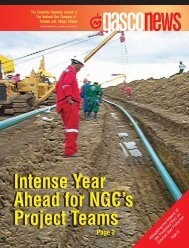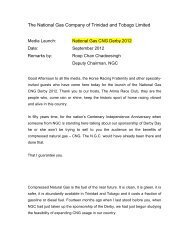June 2012 ISSN 2070-4593 - NGC
June 2012 ISSN 2070-4593 - NGC
June 2012 ISSN 2070-4593 - NGC
Create successful ePaper yourself
Turn your PDF publications into a flip-book with our unique Google optimized e-Paper software.
...students have shown<br />
that they can transcend<br />
tremendous barriers, and<br />
emerge as self sustaining<br />
solar engineers, and changemakers.<br />
Bawor Mamma, for example, has spent<br />
years recovering from the lingering effects of<br />
civil war and economic dislocation in Liberia.<br />
At 53 she prefers assembling solar lanterns to<br />
the physical strain of farming. “I am not just<br />
a farmer like everyone else,” she says with a<br />
clear sense of pride. “I am a solar engineer<br />
now and I want to electrify my village and<br />
other neighbouring villages.”<br />
“What Barefoot College has effectively<br />
demonstrated is how the combination<br />
of traditional knowledge (barefoot) and<br />
demystified modern skills can bring lasting<br />
impact and fundamental change when the<br />
tools are in the control and ownership of<br />
the rural poor,” confirms Dr Bunker Roy, the<br />
Director of the Barefoot College.<br />
The women are also supporting a<br />
greener form of energy usage. Many live in<br />
villages without any electricity at all, where<br />
kerosene usage is high. Yet kerosene is not<br />
a sustainable resource, nor is it cheap or<br />
healthy. Barefoot College estimates that the<br />
initiative now saves around 160,000 litres<br />
of kerosene a month across South America,<br />
Africa and Asia.<br />
To ensure the sustainability of the project,<br />
the new technicians are also taught how<br />
to train other villagers in the maintenance<br />
of these lamps, and encouraged to set up<br />
electronics repairs shops, which will generate<br />
a regular income.<br />
The programme can be a formidable<br />
challenge for the women. “In the beginning,<br />
many women face problems, since it is the<br />
first time they have left their children and<br />
village,” says Leela Devi, a teacher in the<br />
solar engineering department. “But we have<br />
to be like their sisters, and constantly remind<br />
them of the advantages of being here and<br />
learning solar engineering.” Their trainers,<br />
who mostly speak Hindi, must cut across<br />
linguistic and cultural barriers using gestures<br />
and signs.<br />
Yet the desire to light up their communities<br />
and empower the women in them, has proven<br />
a unifying bond. With just six months training<br />
in the college, students have shown that<br />
they can transcend tremendous barriers, and<br />
emerge as self sustaining solar engineers,<br />
and change-makers.<br />
<strong>June</strong> <strong>2012</strong> Earth Conscious 21









